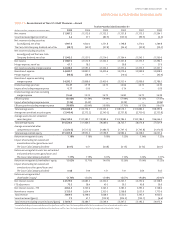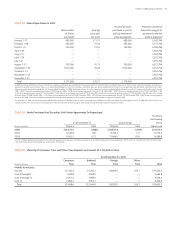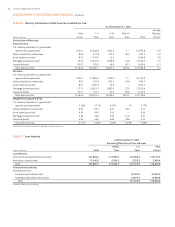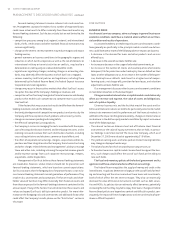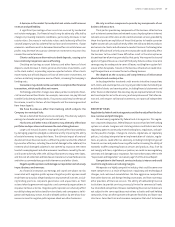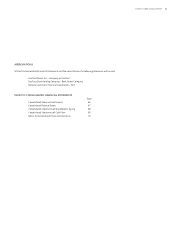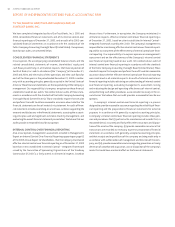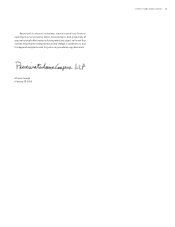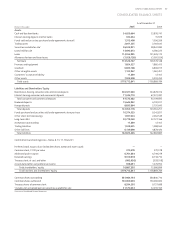SunTrust 2005 Annual Report Download - page 61
Download and view the complete annual report
Please find page 61 of the 2005 SunTrust annual report below. You can navigate through the pages in the report by either clicking on the pages listed below, or by using the keyword search tool below to find specific information within the annual report.SUNTRUST ANNUAL REPORT 59
A decrease in the market for residential real estate could harm our
revenues and profitability.
A significant percentage of our assets are secured by residential
real estate mortgages. Our financial results may be adversely affected by
changes in prevailing economic conditions, particularly decreases in real
estate values. Decreases in real estate values could adversely affect the
value of property used as collateral for our loans and investments. If poor
economic conditions result in decreased demand for real estate loans, our
profits may decrease because our alternative investments may earn less
income than real estate loans.
Clients could pursue alternatives to bank deposits, causing us to
lose a relatively inexpensive source of funding.
Checking and savings account balances and other forms of client
deposits could decrease if clients perceive alternative investments, such
as the stock market, as providing superior expected returns. When clients
move money out of bank deposits in favor of alternative investments, we
can lose a relatively inexpensive source of funds, increasing the Company’s
funding costs.
Consumers may decide not to use banks to complete their financial
transactions, which could affect net income.
Technology and other changes now allow parties to complete finan-
cial transactions without banks. For example, consumers can pay bills and
transfer funds directly without banks. This process could result in the loss of
fee income, as well as the loss of client deposits and the income generated
from those deposits.
We have businesses other than banking which subjects the
Company to a variety of risks.
We are a diversified financial services company. This diversity subjects
earnings to a broader variety of risks and uncertainties.
Hurricanes and other natural disasters may adversely affect loan
portfolios and operations and increase the cost of doing business.
Large scale natural disasters may significantly affect loan portfolios
by damaging properties pledged as collateral and by impairing the ability
of certain borrowers to repay their loans. The ultimate impact of a natural
disaster on future financial results is difficult to predict and will be affected
by a number of factors, including the extent of damage to the collateral, the
extent to which damaged collateral is not covered by insurance, the extent
to which unemployment and other economic conditions caused by the nat-
ural disaster adversely affect the ability of borrowers to repay their loans,
and the cost of collection and foreclosure moratoriums, loan forbearances
and other accommodations granted to borrowers and other clients.
Negative public opinion could damage our reputation and adversely
impact business and revenues.
As a financial institution, our earnings and capital are subject to risks
associated with negative public opinion. Negative public opinion could
result from our actual or alleged conduct in any number of activities, includ-
ing lending practices, corporate governance and acquisitions, or from
actions taken by government regulators and community organizations in
response to those activities. Negative public opinion can adversely affect
our ability to keep and attract and/or retain clients and can expose us to liti-
gation and regulatory action. Actual or alleged conduct by one of our busi-
nesses can result in negative public opinion about our other businesses.
We rely on other companies to provide key components of our
business infrastructure.
Third parties provide key components of the business infrastructure
such as internet connections and network access. Any disruption in internet,
network access or other voice or data communication services provided by
these third parties or any failure of these third parties to handle current or
higher volumes of use could adversely affect the ability to deliver products
and services to clients and otherwise to conduct business. Technological or
financial difficulties of a third party service provider could adversely affect
the business to the extent those difficulties result in the interruption or
discontinuation of services provided by that party. We may not be insured
against all types of losses as a result of third party failures and our insurance
coverage may be inadequate to cover all losses resulting from system fail-
ures or other disruptions. Failures in the business infrastructure could inter-
rupt the operations or increase the costs of doing business.
We depend on the accuracy and completeness of information
about clients and counterparties.
In deciding whether to extend credit or enter into other transactions
with clients and counterparties, we may rely on information furnished by or
on behalf of clients and counterparties, including financial statements and
other financial information. We also may rely on representations of clients
and counterparties as to the accuracy and completeness of that informa-
tion and, with respect to financial statements, on reports of independent
auditors.
INDUSTRY RISKS
Regulation by federal and state agencies could adversely affect the busi-
ness, revenue and profit margins.
We are heavily regulated by federal and state agencies. This regula-
tion is to protect depositors, federal deposit insurance fund and the banking
system as a whole. Congress and state legislatures and federal and state
regulatory agencies continually review banking laws, regulations, and poli-
cies for possible changes. Changes to statutes, regulations, or regulatory
policies, including interpretation or implementation of statutes, regula-
tions, or policies, could affect us adversely, including limiting the types of
financial services and products we may offer and/or increasing the ability of
nonbanks to offer competing financial services and products. Also, if we do
not comply with laws, regulations, or policies, we could receive regulatory
sanctions and damage to our reputation. For more information, refer to the
“Supervision and Regulation” section on page of this Annual Report.
Competition in the financial services industry is intense and could
result in losing business or reducing margins.
We operate in a highly competitive industry that could become even
more competitive as a result of legislative, regulatory and technological
changes, and continued consolidation. We face aggressive competition
from other domestic and foreign lending institutions and from numerous
other providers of financial services. The ability of nonbanking financial
institutions to provide services previously limited to commercial banks
has intensified competition. Because nonbanking financial institutions are
not subject to the same regulatory restrictions as banks and bank holding
companies, they can often operate with greater flexibility and lower cost
structures. Securities firms and insurance companies that elect to become






